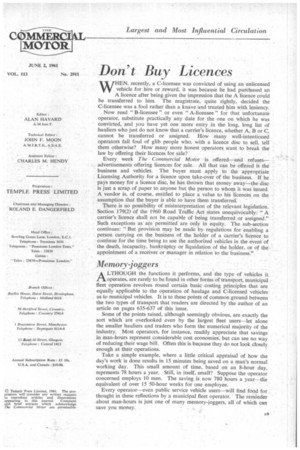Don't Buy Licences
Page 43

If you've noticed an error in this article please click here to report it so we can fix it.
WHEN, recently, a C-licensee was convicted of using an unlicensed vehicle for hire or reward, it was because he had purchased an A licence after being given the impression that the A licence could be transferred to him. The magistrate, quite rightly, decided the C-licensee was a fool rather than a knave and treated him with leniency.
Now read " B-licensee " or even " A-licensee " for that unfortunate operator, substitute practically any date for the one on which he was convicted, and you have yet one more entry in the long, long list of hauliers who just do not know that a carrier's licence, whether A, B or C, cannot be transferred or assigned. How Many well-intentioned operators fall foul of glib people who, with a licence disc to sell, tell them otherwise? How many more honest operators want to break the law by offering their licences for sale?
Every week The Commercial Motor is offered—and refuses • advertisements offering licences for sale. All that can be offered is the business and vehicles. The buyer must apply to the appropriate Licensing Authority for a licence upon take-over of the business. If he pays money for a licence disc, he has thrown that money away—the disc is just a scrap of paper to anyone but the person to whom it was issued. A vendor is, of course, entitled to place a value to his licences on the assumption that the buyer is able to have them transferred.
There is no possibility of misinterpretation of the relevant legislation. Section 179(2) of the 1960 Road Traffic Act states uneqtiivocably: "A carrier's licence shall not be capable of being transferred or assigned." Such exceptions as are permitted are only in equity. The sub-section continues: "But provision may be made by regulations for -enabling a person carrying on the business of the holder of a carrier's licence to continue for the time being to use the authorized vehicles in the event of the death, incapacity, bankruptcy or liquidation of the holder, or of the appointment of a receiver or manager in relation to the business."
Memory-joggers
ALTHOUGH the functions it performs, and the type of vehicles it operates, are rarely to be found in other forins oftransport, municipal fleet operation revolves round certain basic costing principles that are equally applicable to the operation of haulage and C-licensed vehicles as to municipal vehicles. It is to these points of common ground between the two types of transport that readers are directed by the author of an article on pages 635-637 of this issue.
Some of the points raised, although seemingly obvious, are exactly the sort which are overlooked even by the largest fleet users—let alone the smaller hauliers and traders who form the numerical majority of the industry. Most operators, for instance, readily appreciate that savings in man-hours represent considerable cost economies, but can see no way of reducing their wage bill. Often this is because they do not look closely enough at their operations.
Take a simple example, where a little critical appraisal of how the day's work is done results in 15 minutes being saved on a man's normal working day. This small amount of time, based on an 8-hour day, represents 78 hours a year. Still, in itself. small? Suppose the operator concerned employs 10 men. The saving is now 780 hours a year—the equivalent of over 15 50-hour weeks for one employee.
Every operator—even public service vehicle users—will find food for thought in these reflections by a municipal fleet operator. The reminder about man-hours is just one of many memory-joggers, all of which can save you money.
















































































































































































